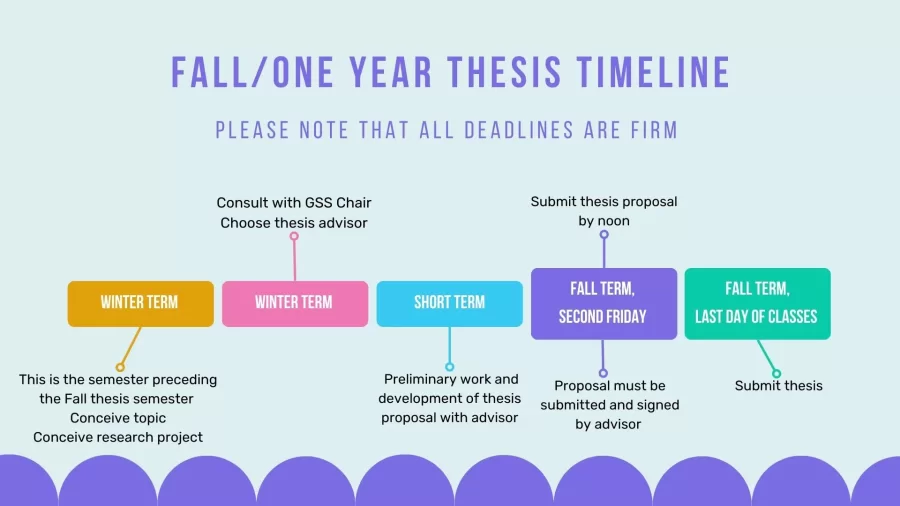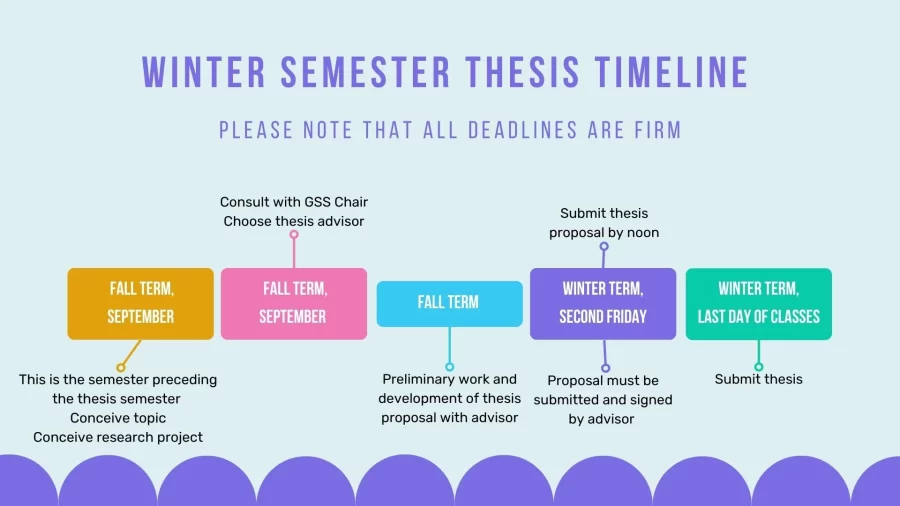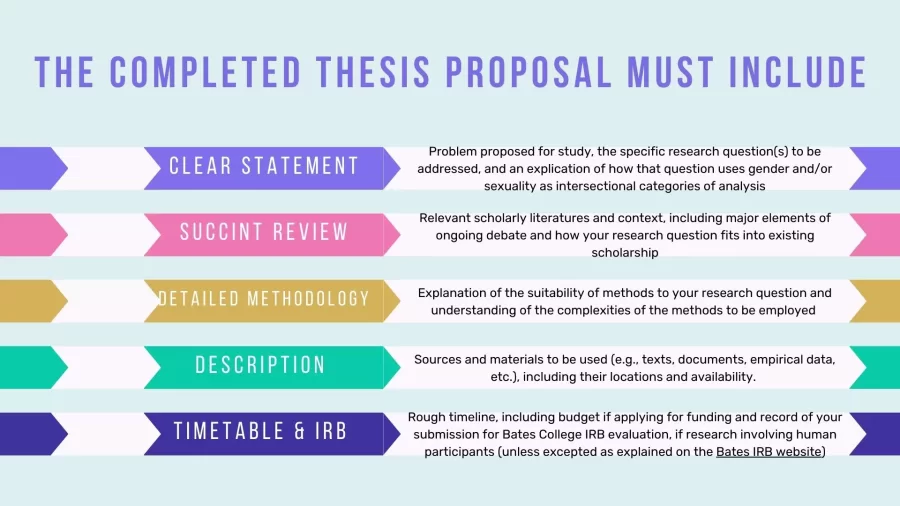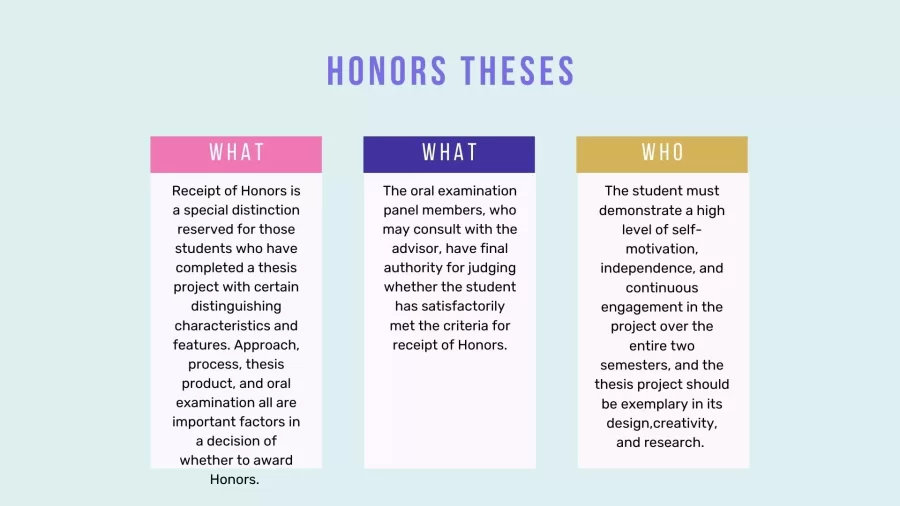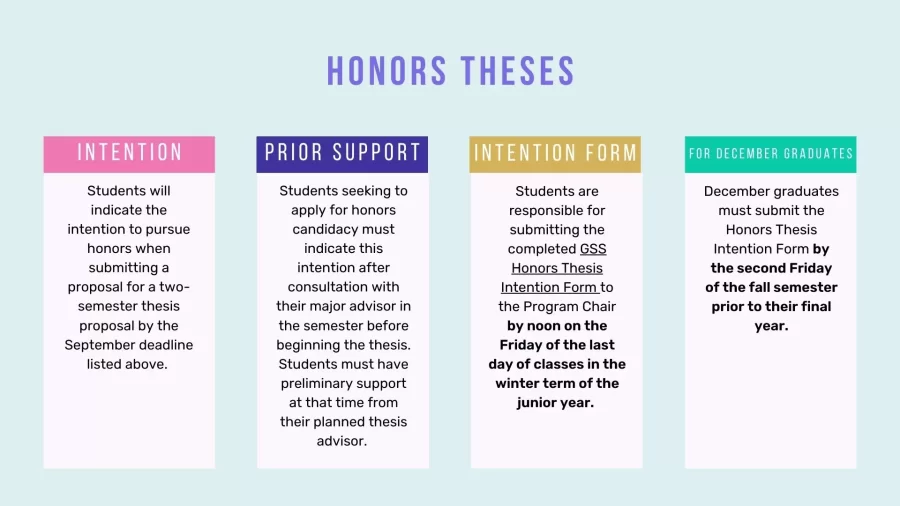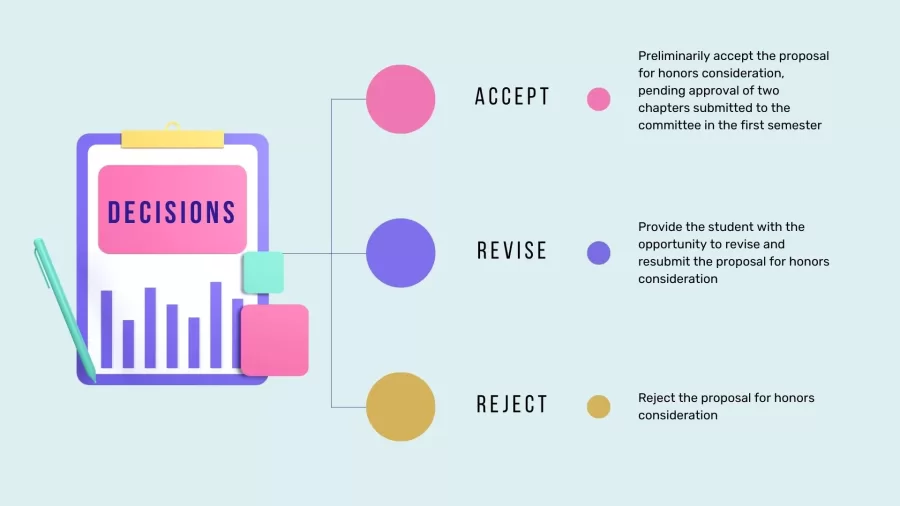GSS Thesis
Thesis Guidelines
The following guidelines are designed to help you navigate the thesis process. We urge you to read them thoroughly, and to consult with the Program chair and/or relevant Program faculty for further assistance. Early and frequent consultation with your advisor is the best route to a successful and rewarding thesis experience.
Begin by reading the work schedule printed below, which is designed to ensure that you consult with the Program Chair, secure a thesis advisor, and choose a reasonable topic before the semester in which you plan to write. Such advance planning will enable you to polish your thesis proposal before submitting it to the Gender and Sexuality Studies (GSS) Program Committee by the stated deadline.
A proposal considered “accepted” must be reviewed by the GSS Program Committee before the end of the “add” period of the semester in which you begin to write your thesis.
Schedule and Deadlines
FALL One-Semester Theses or FALL – WINTER Two-Semester Theses
- Winter Semester Preceding Thesis: Conceive topic and begin to develop research question. Consult with Gender and Sexuality Studies major advisor. Choose thesis advisor.
- Short Term Preceding Thesis: Work on preliminary research and development of thesis proposal with thesis advisor.
- Second Friday of the Fall Thesis Semester: Deadline for fall and two-semester thesis proposals. Submit your carefully revised and edited thesis proposal by NOON to Matt Von Vogt (mvonvogt@bates.edu). Note: the Thesis Proposal Cover Sheet must be signed by your advisor.
- Friday, Last Day of Classes, Fall Semester: Fall semester thesis deadline.
WINTER One-Semester Theses
- September Preceding Thesis: Conceive topic and begin to develop research question. Consult with Gender and Sexuality Studies major advisor. Choose thesis advisor.
- Fall Semester Preceding Thesis: Work on preliminary research and develop thesis proposal in consultation with advisor.
- Second Friday of the Winter Thesis Semester: Deadline for winter semester thesis proposals. Submit your carefully revised and edited thesis proposal by NOON to Matt Von Vogt (mvonvogt@bates.edu). Note: the Thesis Proposal Cover Sheet must be signed by your advisor (please see the form at the bottom of this page).
- Last Day of Classes, Winter Semester: Winter semester thesis deadline.
We cannot emphasize strongly enough the importance of timeliness in the preparation of all thesis materials: all deadlines are firm. Should problems with timeliness prove to be an issue with any particular student, the Committee and the advisor together may reduce the final grade for GSS 457 or GSS 458.
INSTRUCTIONS FOR WRITING A PROPOSAL and THESIS
Preparation
Your GSS thesis advisor does not need to be a current member of the GSS Program Committee; any member of the Bates faculty who is familiar with studies of gender and sexuality in the relevant scholarly area(s) of your focus may advise the work. Work closely with your advisor to develop your topic and proposal. Your advisor will help guide the development of your thesis, set deadlines for completion, and determine an appropriate citation format. Students are expected to meet regularly with the advisor, to compose and revise drafts, to keep appointments, and to meet agreed-upon deadlines. Students should reflect carefully on formal comments received from the advisor, and demonstrate initiative and independence during the project. The advisor is responsible for evaluating the final project. Approach, process, and thesis product all are important factors in this evaluation.
Writing the Proposal
A strong proposal identifies the significance of the project for the field of Gender and Sexuality Studies, reflects the program’s three core guidelines for theses (below), and provides a plan for your research and writing. Proposals for one-semester theses should be roughly four to six pages in length, excluding notes and bibliographies. Proposals for two-semester theses should be between six and ten pages in length, excluding notes and bibliographies.
Each proposal should include:
- A clear statement of the problem proposed for study and the specific research question(s) to be addressed.
- A brief summary of relevant scholarly literatures. The proposal should demonstrate that you have familiarized yourself with major tensions or questions in the related literature, and how your research question fits into those existing conversations.
- A clear, detailed discussion of the research methods to be used (e.g. semi-structured interviews, content analysis, digital ethnography), which both explains the suitability of your methods to your research question and articulates your understanding of the complexities or limitations of the methods to be employed.
- A brief description of the materials to be used in the research (e.g., texts, documents, quantitative data, interviews and interview subjects, etc.), as well as the locations and/or availability of these materials. Include a rough timetable for research (and budget, if applying for research funds).
The proposal must reflect your grasp of the following three core guidelines:
Theses use gender and/or sexuality as intersectional categories of analysis.
Your thesis must be informed by an understanding that gender and sexuality are dynamic systems operating in inextricable relation with other dynamic systems of social power. Both the research question and methodology you employ will need to indicate your grasp of the topic in intersectional terms.
Theses are interdisciplinary in methodology.
We expect that you will use your training in Gender and Sexuality Studies to enlarge or transform the perspective that a traditional discipline might bring to bear on a problem. Interdisciplinary methodology requires awareness of how disciplinary approaches and methods may be linked advantageously to conduct scholarly inquiry. The methodology section of your thesis should be as detailed as possible; it may help to draw on notes and reference material from INDS 250 (“Methods and Modes of Inquiry”).
Note: all students planning research involving human subjects or participants must submit their work to the Bates College Institutional Review Board unless their research plan meets the criteria for exemption outlined on the Bates IRB website.
Theses may take multiple forms.
For students with appropriate expertise, from previous coursework or other experiences, the Program Committee welcomes research theses based on community-engaged research or public scholarship methodologies, as well as other formats such as the publication of creative writing, the performance of new work, the curation of public events, or the organization of participatory workshops. Please see the Alternative Thesis Guidelines for more information.
Honors Theses
Receipt of Honors in Gender and Sexuality Studies is a special distinction reserved for those students who have completed a thesis project with certain distinguishing characteristics and features. The student must demonstrate a high level of self-motivation, independence, and continuous engagement in the project over the entire two semesters, and the thesis project should be exemplary in its design, methodological rigor, creativity, and depth. The thesis and oral examination should use scholarship in the field of gender and sexuality studies to advance our understanding of an important topic. The final thesis must develop the necessary background, theory, and/or methodology for the project and the thesis should include a thorough discussion and citation of relevant published literature. Students must exhibit comprehension of the debates related to their topic and successfully articulate how their work contributes to ongoing scholarly conversation. Approach, process, thesis product, and oral examination all are important factors in a decision of whether to award Honors. The oral examination panel, not the advisor, holds final authority over whether the student has satisfactorily met the criteria for receipt of Honors.
Each academic program at Bates maintains its own policies and procedures for determining students’ candidacy for honors in the major. In GSS, students seeking to apply for honors candidacy must clearly indicate this intention after consultation with their major advisor in the semester before beginning the thesis. Students must also have preliminary support at that time from their planned thesis advisor. Students are responsible for submitting the completed GSS Honors Thesis Intention Form to the Program Chair by noon on the Friday of the last day of classes in the winter term of the junior year. (December graduates must submit the Honors Thesis Intention Form by the second Friday of the fall semester prior to their final year).
The Faculty Program Committee studies the proposal submitted with honors candidacy in mind, and returns a formal letter of review to the student applicant. That letter of review will either:
- reject the proposal for honors consideration;
- provide the student with the opportunity to revise and resubmit the proposal for honors consideration;
- preliminarily accept the proposal for honors consideration, pending approval of chapters submitted to the committee in the first semester;
- or preliminarily accept the proposal, pending approval of the student’s advisor in January.
Student should pay careful attention to the letters of review provided by the Program Committee when preparing this work. Students must have made considerable progress on the thesis in the fall semester to be put forward for honors in January. The thesis advisor, in consultation with the Program Committee, has the authority to withdraw the student from the Honors program at any time prior to the submission deadline for the written thesis.
Students seeking to apply for honors in two majors must adhere to the honors policies and procedures of both GSS and the other department or program. Further information about College-wide honors guidelines may be found on the Honors Program web page. Further questions about honors candidacy and the honors process in GSS may be directed to the Program Chair.
Thesis Writers Group
The Program Committee recognizes the myriad challenges of producing an effective interdisciplinary thesis. To help you address some of these challenges, the Program Committee holds regular discussion meetings for thesis writers to gather together and share concerns, facilitated by Program faculty. Attendance is mandatory.
